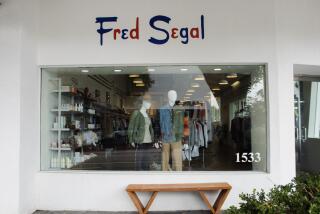2 Top Women’s Swimwear Makers Up for Sale : Retail: Catalina and Cole of California are on the block. If sold, it would be the third time in eight years.
- Share via
Two longtime trend setters in women’s swimwear--Catalina and Cole of California--are up for sale amid widespread reports they are struggling financially, The Times has learned.
Cole and Catalina--which also makes sportswear--are part of Taren Holdings, a privately held company in Los Angeles that’s controlled by Odyssey Partners, an investment partnership in New York.
Odyssey is peddling all of Taren, according to two industry insiders who said they were approached about buying the company, although no potential purchase price was discussed. Taren, believed to have annual sales between $200 million and $300 million, also operates apparel stores in Southern California under The Outlet name and owns Colonial Corp. of America, a Tennessee-based maker of private-label apparel.
Neither Odyssey nor Taren would comment.
Cole and Catalina have long been prominent players in the swimsuit business and have been key contributors to Southern California’s heritage as the nation’s center of beach-wear design.
Fred Cole, a former silent-movie actor in Hollywood who started the company bearing his name, is said to have produced the nation’s first “fashion” swimsuit in 1925, which was highlighted by its plunging backline.
His daughter, Anne Cole, is still a Cole executive and one of the company’s lines still carries her name. She also declined comment.
But Catalina and Cole are now hurting for a variety of reasons, industry executives said: stiffer competition, some designs that are passe and a customer base of older women who are not buying as many suits.
Cole’s and Catalina’s styles “have not worked as well as they did three or four years ago,” said one Southern California competitor.
Alan Millstein, publisher of the Fashion Network Report in New York, said the aging female market is “not as willing to dare to bare” with swimsuits, and also has curbed swimsuit purchases because of repeated medical warnings about the dangers of overexposure to sunlight.
There’s another problem: Cole and Catalina are often sold in department stores, yet “the service level at department stores has disappeared in many cases, and it’s a product that cries out for help,” said Robert Klein, general manager for swimwear at Jantzen.
Many women are opting to buy less-expensive suits on their own at discount outlets. Indeed, NPD Group, a research firm, says sales of women’s swimsuits through factory-outlet stores have soared 73% since 1989, but sales through department stores and specialty retailers have edged up only 2%.
There’s also “a lot of new competition”--particularly from imports that are increasingly being sold under private labels through such mass-merchandisers as Wal-Mart and Kmart, and those new rivals are also taking market share from established “brand-label” players such as Cole and Catalina, said Gary Abeyta, publisher of the trade magazine The Swim Journal.
“The pie in the industry is only so big, and the slices are getting smaller,” he said.
Litigation filed against Taren last fall also “really hurt their business,” according to one industry official.
Brought by a Northridge-based retailer named Bea’s Swim & Sport, the lawsuit charged that Taren was selling swimsuits to Bea’s at higher prices than through its own outlet stores.
Publicity about the case left other retailers wary about buying suits from Taren, the official said. Taren has declined comment on the suit, which is still pending.
Finally, Cole and Catalina are also saddled with other problems afflicting much of their industry, executives said.
The recession has curbed consumers’ spending in general and their vacation plans in particular. Abeyta said abnormally cool weather this spring also got 1993 sales off to a particularly slow start.
Taren was created in 1989 by closely held Odyssey and apparel veteran James I. Spiegel when they purchased the Cole, Catalina and Colonial lines from Santa Monica-based congolomerate Wickes Cos. (now called Collins & Aikman Group Inc.) for an undisclosed price.
Odyssey had considered offering Taren’s stock to the public to bolster its growth, but Taren’s results were not nearly strong enough, one competitor said. “That was one of their earlier goals, to take the company public and cash out,” he said.
So Taren has tried to preserve cash by cutting costs. The company has merged Cole’s operations into Catalina’s headquarters on Bandini Blvd. in Commerce.
An aide to Leon Levy, Odyssey’s senior partner, said Levy had no comment.
Taren’s president, Michael Proies, also declined comment except to deny that Taren plans to close any of its retail stores--a move that also has been speculated by some executives in the apparel trade.
Despite their well-known brands, Cole and Catalina would be changing hands for the third time in the past eight years if they’re sold again.
More to Read
Inside the business of entertainment
The Wide Shot brings you news, analysis and insights on everything from streaming wars to production — and what it all means for the future.
You may occasionally receive promotional content from the Los Angeles Times.











